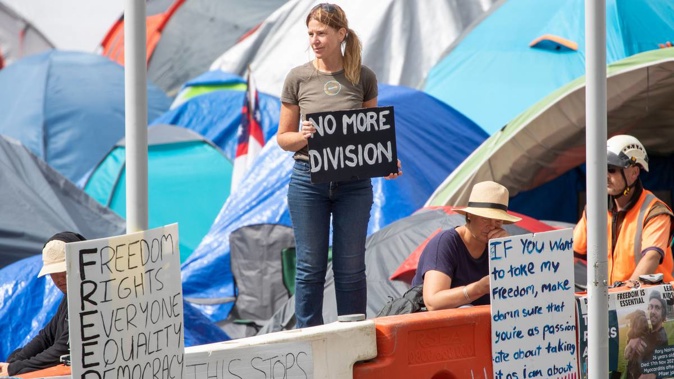
Reports of private vessels planning to leave Picton with protesters and supplies on board have police and Maritime New Zealand on standby.
It comes on day 16 of the protest's occupation at Parliament, which turned violent yesterday following an early morning police operation to further encircle the demonstration.
Greater Wellington's Harbourmaster Grant Nalder says his team are working to ensure anyone attempting to cross the Cook Strait is aware of the inherent dangers and the obligations on them once they enter the Wellington region.
"Crossing the strait is not for the faint-hearted - a degree of experience is needed to understand both the dangers that exist and the obligations of operating a vessel in our region," Nalder said.
"Cook Strait on a calm day is quite nice but if you get it wrong it can be quite unforgiving and we don't want anything to go wrong out there."
"If they turn up without any thought or forward planning in terms of what they're going to do or where they're going to go, that becomes a problem."
Councillor Penny Gaylor, who is chairwoman of Greater Wellington's Environment Committee said they needed to ensure waters remained safe for all to use and access.
"Our region has had to endure significant disruption because of the actions of some protesters and we don't want that spilling, literally or figuratively, into our waters."
On Monday, a vessel from Picton was pictured delivering protesters and supplies at Wellington's Queens Wharf.
Free parking at Sky Stadium will also come to an end tomorrow, chief executive Shane Harmon confirmed.
The offer of free parking was made early on in the demonstration in a bid to unclog the streets around Parliament.
Sky stadium chief executive Shane Harmon said the scheme had been "partially successful", but it was time to return to normal.
"The 10 days offered has been more than generous on our part and it's time to return to normal."
Meanwhile a "conciliatory process" led by the Human Rights Commissioner is under way in an effort to deescalate the protest at Parliament.
Held yesterday, the meeting will include representatives from Voices for Freedom and the Human Rights Commission, as well as police, Freedom and Rights Coalition and independents.
Hunt said his duty as Human Rights Commissioner was to "listen, conciliate, educate and advance human rights and responsibilities for all."
"It's clear that the protesters who I have met with have very real stories of loss and suffering. They feel broken and discarded due to the impact of Covid-19 health measures on their lives."
Hunt said some of the protesters had lost loved ones, had had "suffered the side effects of vaccination" or lost their jobs.
/cloudfront-ap-southeast-2.images.arcpublishing.com/nzme/BU2AVNCKC6UD4HSSBGSFDU7CJQ.jpg)
Day 16 of the anti-mandate protests at Parliament in Wellington. Photo / George Heard
He condemned the "outrageous conduct" from some protesters and made it clear he was not affirming their views.
He acknowledged the ongoing harmful impact of the protest but said listening to the protesters was an important step in preventing further violence, as seen in other Covid-related protests overseas.
"In such a heated, fraught moment, we have to move from fear, to hope, and that cannot be done without listening and talking."
The commission, which has faced an unprecedented increased in complaints since the introduction of the traffic light system, recently provided a report on special conditions that vaccine mandates should meet to fulfill human rights requirements.
The conciliation would continue in stages and involve a range of stakeholders, including mana whenua, police, the Commission's chief mediator and Wellington mayor Andy Foster.
Hunt had also asked the Prime Minister to ensure her Government engaged in this "constructive process".
It comes after Foster defended twice meeting with protesters, saying police had wanted him to do it.
Speaking to Nick Mills on Newstalk ZB's Wellington mornings, Foster said he had now met with protesters twice, with the support of police.
"I got in touch with the police at the highest level and said 'look, do you think this is potentially valuable and helpful' and the answer was 'yes'," he said.
"The police are talking too, and if they didn't think it was worth talking, the police wouldn't be doing it either."
While he respected the Government's decision not to engage with protesters, he said only dialogue was going to resolve the protest.
"We can all stand on the sidelines and say 'please go' but that's not actually going to achieve that, it's only when you're getting in there and listening to people and talking to people when you actually have a chance of getting a result."
Without dialogue he said the only options for resolving the protest were allowing time, or intervening with violence – both of which were unattractive.
He maintained his two meetings had been productive. The first, based around graffiti on the Cenotaph, had resulted in its removal, while the second had focused on reducing the protest's impact on the city.
Foster admitted the protest is made up of diverse groups, and it was difficult to know whether he had spoken to people that could act decisively for the demonstration as a whole.
"It is challenging, and police are finding it challenging to find the people that are going to make decisions … but that's part of talking – if you don't talk, you're never going to know."
He said his meeting with protesters was not legitimising the actions of those that behaved violently.
But Wellington city councillor Fleur Fitzsimmons said the mayor's meeting with protesters sent a "dangerous message" to people who wanted to be heard by government.
"When he met with the protesters, it sent a dangerous message that the violence and the threats and the spreading of conspiracy theories have no consequence, and that that's how you get heard in this city," she told Mills.
"I really don't want that to be the message to a lot of community groups that try really hard to get the attention of the mayor and councillors."
Meanwhile Police Minister Poto Williams said the protests had been "really distressing" for the people of Wellington and particularly for those in close proximity to Parliament.
"It's distressing that it's come to the point where people are harmed and our police that are trying to keep us safe are being put in harm's way."
She backed "100 per cent" the work of police over recent days to minimise the impact of the protest on Wellington, and said the Government doing everything it could to support police.
"The police have been extraordinary, they do put themselves on the line and they shouldn't have to have the kinds of treatment they've been getting," she said.
"The protest needs to become lawful if it is to continue. My view is that it shouldn't continue."
Take your Radio, Podcasts and Music with you









